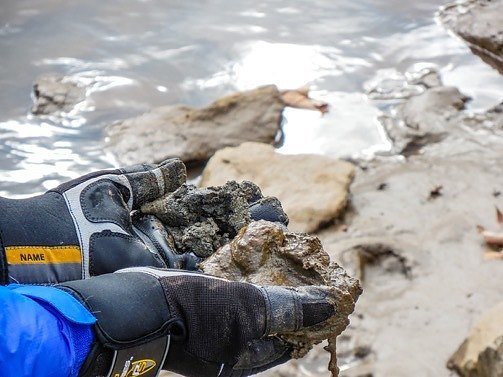Dan River core samples show coal ash in sediment 40 miles from spill site
By: Waterkeeper Alliance

January 30, 2015 — MILTON, NC — Samples taken Friday morning from the Dan River bottom in Milton, about 40 miles from the site of a massive coal ash spill one year ago, show a thick, gray layer of coal ash in the river’s sediment. See photos here.
Representatives from Waterkeeper Alliance and Neuse Riverkeeper Foundation took the core samples in anticipation of the state Department of Environment and Natural Resources’ water testing at a boat ramp northwest of Milton in Caswell County.
“Duke Energy only retrieved about 7 percent of the 39,000 gallons of ash it spilled into the Dan River last February, so there’s no question that the other 93 percent remains in the river,” said Peter Harrison, staff attorney for Waterkeeper Alliance. “Even one year after the spill, there’s still a lingering danger to downstream communities since the contaminants remain in the sediment, exposing people and aquatic life to toxic heavy metals.”
The spill’s long-term impact on the ecological health of the Dan River is unknown. There’s also concern over the potential harm to people as toxic heavy metals move up the food chain. This fish bioaccumulation study by researchers at the Oak Ridge National Laboratories and the Tennessee Valley Authority showed elevated levels of arsenic and selenium in fish downstream of the Kingston coal ash spill in Tennessee. This study published in Integrated Environmental Assessment and Management showed that arsenic and selenium remained in river sediment at levels that impacted aquatic life after the Kingston spill.
State environmental regulators have consistently aligned with Duke Energy in downplaying the spill’s impact on the environment, wildlife and public health.
“Our state environmental agency shouldn’t be helping Duke Energy mislead the public about the damage it caused to the Dan River,” said Upper Neuse Rivekeeper Matthew Starr. “We need them to step up and prioritize a full cleanup for all 14 Duke Energy facilities in North Carolina where coal ash is stored in unlined pits adjacent to our rivers, lakes and streams. Coal ash needs to be moved to safe, dry, lined storage away from waterways.”
Contacts:
Peter Harrison, Waterkeeper Alliance, 828-582-0422
Matthew Starr, Upper Neuse Riverkeeper, 919-961-2240